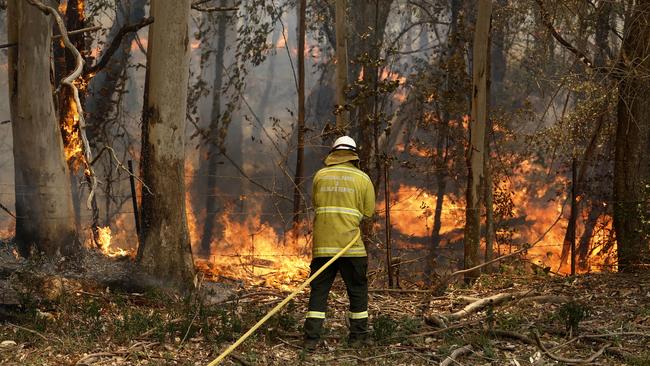Logging contributed least in black summer bushfires, report finds
New research challenges the notion that logging has contributed to the severity of the black summer bushfires.

The Black Summer bushfires of 2019-20 were not made worse by logging but rather by three years of below-average rainfall which led to an abundance of overly dry vegetation, a study has found.
The scale and severity of the fires was best explained by extreme drought and anomalous fire weather conditions — factors that completely overwrote the influence of past fires and logging, according to the report.
The study into the severity and extent of the 2019–20 forest fires was led by University of Tasmania professors David Bowman and Grant Williamson.
Using fire severity data from the NSW and Victorian government, they conducted a geospatial analysis of three large areas across northern and southern NSW and Victoria and found that “weather clearly affects fire severity, regardless of disturbance history across the three study areas”.
“Extreme fire weather conditions and topography have a much greater influence compared to disturbance history in causing severe fires,” the report concludes.
Charles Darwin University associate professor Brett Murphy said the study contradicted earlier work by Australian National University researchers, which suggested that logging could increase the flammability of forests.
“It seems likely that under very extreme fire weather conditions, such as those experienced in the summer of 2019-20, the effect of forest management becomes irrelevant,” he said.
“Forest management, including whether there had been logging or prescribed burning, was of little importance.”
University of Melbourne professor Rodney Keenan said the report had put to bed arguments that the Black Summer bushfires were made worse by logging.
“Little evidence from those fires has been presented to support these contentions,” he said.
“Policy proposals to mitigate fire risks and impacts should be evidence-based and integrate multiple perspectives.
“Traditional Indigenous knowledge, experience of local and professional fire managers, and the breadth of evidence from bushfire research should inform strategies for reducing bushfire impacts and increasing forest resilience and community.”
Professor Murphy said the research was “alarming” as it alluded to there being little in the way of fire prevention.
“This new research clearly suggests that under future climate change, bushfire catastrophes are likely to become more frequent, and there is very little that land managers will be able to do to prevent this,” he said.
“The most effective way to prevent future bushfire catastrophes is to take immediate and strong action to prevent further climate change.”








To join the conversation, please log in. Don't have an account? Register
Join the conversation, you are commenting as Logout